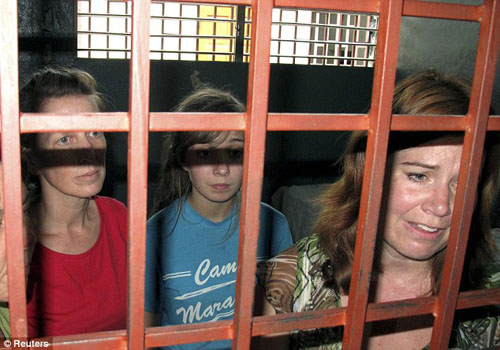
By Dady Chery
Of all the campaigns to undermine Haitian culture, the one to discredit restavek adoption ? in which a biological parent collaborates with a respected adult to care for a child ? enjoys the most zealous support from the west?s NGO and alternative press. This campaign reached fever pitch after Haiti?s Prime Minister called a moratorium on foreign adoptions in late January 2010 to prevent the removal of children from the country during the confusion that followed the January 12th earthquake.
Haitians unworthy of their children
Talking point: Haitian adoptive parents are, without exception, child abusers.
Reuters had this to say on February 2, 2010.
?Deeply ingrained in the culture of the impoverished former slave colony, the practice of poor families giving away children to wealthier acquaintances or relatives is known in the native Creole as ?restavek,? from the French words rester avec, or ?to stay with.?
?Critics call it slavery.
?The children, they said, are taken in as servants, forced to work without pay, isolated from other children in the household and seldom sent to school.?
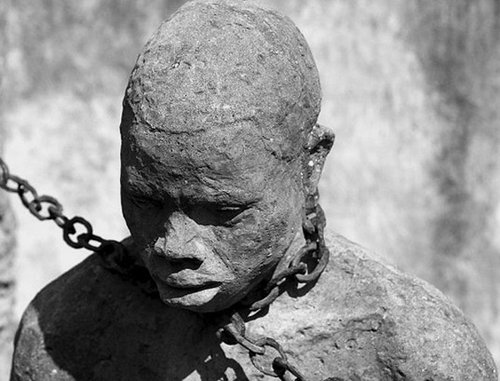
The New York Times continued on February 25, 2010 with a video introduced by the caption.
?Even before the earthquake, one option for Port-au-Prince?s homeless children was Restavek, an underground system that some call foster care, and others call child slavery. Now their numbers swell.?
Note the deft language from Reuters and NYT to suggest that Haitians are child slavers without saying so outright:
?Critics call it slavery?/?others call child slavery.?
Meaning: We, of course, would never claim anything so outrageous.
By contrast, the alternative press? Council on Hemispheric Affairs expounded in July 2010:
?In the most impoverished country in the hemisphere, adults regularly view children as economic commodities, which make them highly vulnerable to the perils of trafficking.?
Beverly Bell, who directs several NGO and claims the defense of Haitian children as one of her main causes, wrote in a Huffington Post article titled: ?A Second Slave Rebellion in Haiti: What?s the Worth of a Haitian Child??:
?One of the many effects of poverty in Haiti is that desperate parents regularly give away their children in the hope that the new family will feed and educate the children better than they themselves can. Instead, the children usually end up as child slaves, or restavek. In a country which overthrew slavery in 1804, today anywhere from 225,000 to 300,000 children live in forced servitude. They work from before sunup to after sundown, are often sexually and physically abused, and usually go underfed and uneducated.?
The message is clear: it is desirable, even admirable, to snatch Haitian children from a culture of abuse in adoptive Haitian families.
Thus, as the Native-American and many other cultures were undermined by removing children from their families, today a project is underway to dismantle Haiti?s culture by shipping its youngest citizens, at a rate of 2,000 children per year, to foreign adoptions. This project is only possible because of a disinformation campaign that is most strident in the alternative press.
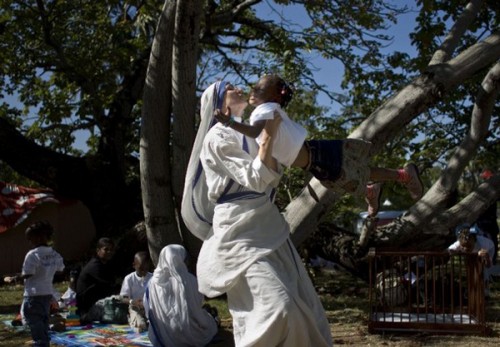
Missionaries of Charity holds up a Haitian girl in Port-au-Prince, Haiti, Tuesday Dec. 21, 2010, scheduled to be transported to France along with 317 other Haitian children for Christmas 2010 (AP/Ramon Espinosa).
Haiti?s child abusers and traffickers
It would have been right and proper to mention, in any article during 2010 on the maltreatment of Haitian children, that Laura Silsby and nine other American Baptist missionaries were in jail in Haiti for attempting to traffic to the Dominican Republic 33 Haitian children, 22 of whom had at least one living parent. Simultaneously in the U.S., Catholic missionary Douglas Perlitz stood accused of the rape and psychological torture of 16 boys in a homeless shelter he had founded in Haiti.
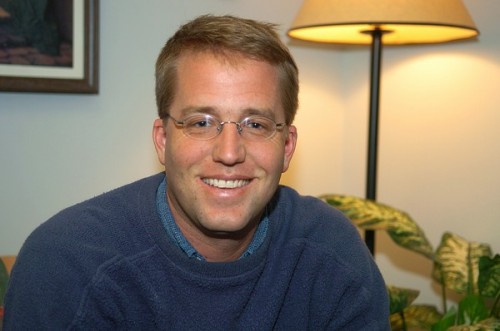
Douglas Perlitz, a graduate of Fairfield University, Connecticut, talks on November 1, 2004 about his missionary work with Haitian street children. On December 21, 2010 he was sentenced to 20 years in prison for sex abuse (AP/The Connecticut Post/Jeff Bustraan).
?
The most shocking news came from Haitian Prime Minister Jean-Max Bellerive who publicly noted during an interview:
?There is organ trafficking for children and other persons also, because they need all types of organs.?
Such horrible abuse is possible because of a lack of follow up to Haiti?s international adoptions.
The same journalists who attacked Haitian adoption kept silent on these well-founded stories of child trafficking and abuse by westerners.
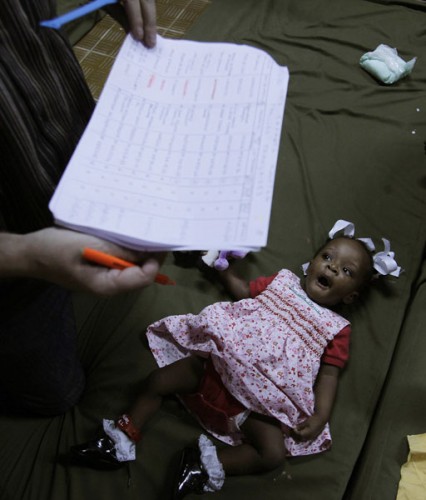
French consulate Jean Pierre Guegan checks for Rose Prioul?s name on his manifest before loading the child on a bus for the airport in Port-au-Prince (AP/Julie Jacobson).
Real Restavek adoption
As one who is familiar with restavek adoption, I can recommend the following descriptions by anthropologists as being accurate. Here is what Katherine Dunham (in: Island Possessed, University of Chicago Press, 1969) wrote.
?In Haiti parents of the peasant class love their children. They also love the children of everyone else and expect everyone to love their children. There exists a whole naming practice for ?adopted? children among the people themselves ? Bienaimee, Dieudonne, Beinvenue, [Beloved, God-given, Welcomed-one] others representing affectionate regard. It is also remarkable in Haiti that there are not the roving bands of homeless young that one finds in other islands ? Jamaica and Puerto Rico for instance.?It is this care for the young that prompts parents when they are not able to feed all the children for whom they are responsible to seek homes for them. It seems best for all concerned to let one or more of the children out in semi-adoption to someone better placed?. The parent? would return to the country hoping for shoes, sufficient food and clothing, medical care, and eventually schooling for the child.?
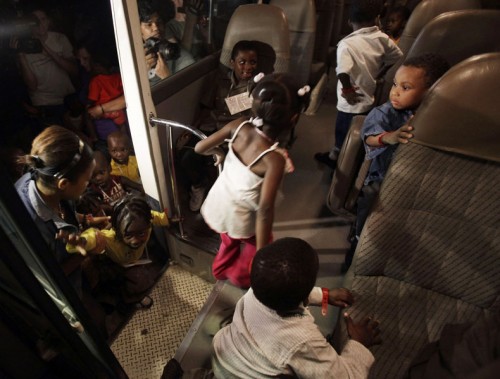
Children board a bus headed for the airport in Port-au-Prince. Several children are being sent for adoption to France by the school Lycee Francais and the French Embassy in Haiti (AP/Julie Jacobson).
Here is a description by renowned anthropologist Melville J. Herskovits (in: Life in a Haitian Valley, Marcus Weiner Publishers, 1937):
?Quasi-adoption involves children, often of peasants?. To ?give? a person a child in this manner is in Mirebalais regarded as a token of friendship, and such children as were observed, though poorly clothed, were fed not much differently from the children of the families with which they were sent to live. When the ?ti moun? [child] grows older, he leaves and returns to his home?. Such a child repays the cost of keeping him by helping in the garden and by running errands.?
In my own family, where my mother served as a restavek and my aunt adopted a restavek, in each case a poorer woman placed a teenage girl with a woman of greater means (though not rich) whom she esteemed, and both women collaborated on the care and education of the child. The biological parent did not ?give away? her child but lived in the same city, maintained contact with the child and could withdraw her from the situation at any time.
Could western adoptions ever withstand such transparency and uncertainty?
Representations of restavek as being ?informal? or ?underground? are disingenuous. According to Haitian law, only partial adoptions that allow the biological parents contact with their children were recognized in Haiti before June 2012 (before the country became a signatory to the Hague Convention). In other words, all foreign full adoptions from Haiti were illegal before this Summer.
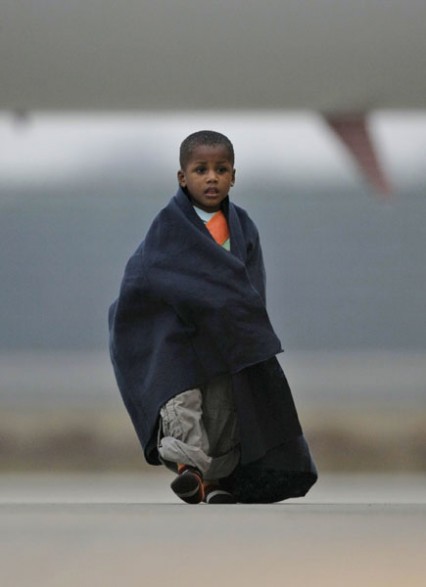
A Haitian child walks to a bus after arriving at a military airport in Eindhoven, Netherlands, along with 105 other children from Haiti, aged 6 months to 7 years, on Thursday Jan. 21, 2010, (AP/Peter Dejong).
Many poor Haitian children ? my own mother included ? have had their education, and their flight abroad to help wrest their families from poverty, sponsored by restavek adoption. By linking Haitian rich and poor, and those at home to those abroad in the care of children, this unconventional adoption system denies souls to the sweatshops and impedes neo-colonialism.
?
Editor?s Notes: Featured photograph of Laura Silsby and other missionaries imprisoned in Haiti from Reuters.
? Copyright 2012. Dady Chery is a journalist, playwright, essayist and poet, who writes in English, French and her native Creole. She is the Editor of Haiti Chery.
Related:
- Colonialism of the Mind ? Part I
?
?
Source: http://newsjunkiepost.com/2012/09/28/colonialism-of-the-mind-part-ii/
houston texans houston texans NFL scores week 3 kat dennings Steve Sabol Yom Kippur 2012 detroit lions
No comments:
Post a Comment
Note: Only a member of this blog may post a comment.